The deaths of at least 21 people in separate violent incidents in Papua have returned attention to ongoing conflicts that mar Indonesia's easternmost province.
More than 2,000 pro-independence supporters rallied in Indonesia's remote Papua province on Tuesday following political violence that killed at least 21 people.
In the capital, Jayapura, demonstrators marched past heavily armed police in support of a referendum on independence and to renounce a 1969 U.N.-backed vote that brought Papua under Indonesia's control. Many Papuans consider that vote a sham since only around 1,000 people participated, most under intimidation.
Andreas Harsono, a researcher for Human Rights Watch, explains why indigenous Papuans feel the referendum was not legitimate.
"Those representatives were all coerced to vote for Indonesia," said Harsono. "There are a lot of stories about how people who showed opposition over integration were tortured, were arrested and even killed."
Security analysts say ongoing protests reveal the simmering tensions that still grip Papua, where a low-level separatist movement has stoked a decades-long conflict. They also warn that violent flare-ups result from festering political grievances.
In 2001 Jakarta granted Papua special autonomy status, which in part allows indigenous Papuans more control over tax revenues derived from natural resource extraction.
The province is rich in natural resources and is home to U.S. gold and copper mining giant Freeport McMoRan. Tensions there between workers and security forces have also led to violence.
Papuans say efforts toward greater autonomy have been ineffective. In the 10 years since gaining special status they've seen little improvement in poverty and unemployment. Economic marginalization, human rights abuses by Indonesian security forces and an influx of migrants that snap up the best jobs are all reasons the independence movement still carries traction.
During past protests police have arrested peaceful demonstrators for carrying the Morning Star flag, the banner of Papua's independence movement. Displaying separatist symbols is a treasonable offense in Indonesia punishable by life imprisonment.
On Tuesday, however, police acted with restraint, arresting only one protestor. The government tightly controls foreign journalists' and non-governmental organizations' access to Papua, but Harsono says the lack of force on Tuesday is a positive sign that stories of discrimination and abuse are being told.
"Because internal attention on West Papua is getting bigger and bigger, they cannot do the same business as usual," added Harsono. "Now they know there is Internet, Facebook, Twitter, You Tube, and it's created a lot of problems for Indonesian diplomacy over West Papua. That's why they're working hard to restrain their officers on the ground not to beat people."
Violence is still taking place, however, and some security analysts have warned of increased radicalization by groups that feel violence is the only way to draw international attention to their cause.
Tuesday's protests followed two separate incidents of political violence. On Saturday more than 17 people were killed in fighting between clans backing rival candidates for upcoming district elections. Then on Monday armed men blocked a road outside Jayapura, hacking to death four people during an early morning ambush.
Some authorities blame the attacks on the Free Papua Movement, an armed guerilla group that has fought for independence from Indonesia for more than four decades. But activists say the government is trying to discredit their calls for independence.
The West Papua National Committee is at the forefront of efforts to achieve greater sovereignty. Oktovianus Pogau, the committee's secretary general in Jakarta, says the police always try to change or alter the action that happens during the protests so that many Papuans are stepped on and their reason for acting is tarnished.
A spokesman for the Papua police was careful not to blame the separatists for Monday's ambush when speaking to local media. He did say, however, that officers found a separatist flag at the scene.
Tuesday's protests coincided with a conference in London where parliamentarians and non-governmental organizations discussed Papuan independence.
Many activists say what is needed to improve conditions in Papua is a dialogue with the Indonesian government, and various organizations have drafted roadmaps to guide talks between the two sides.
Papuan activist Benny Wenda, an escaped political prisoner now in England, is leading the International Parliamentarians for West Papua, a group modeled on a similar organization that helped East Timor secure independence from Indonesia.
Violence, Protests Underscore Papuan Independence Movement




